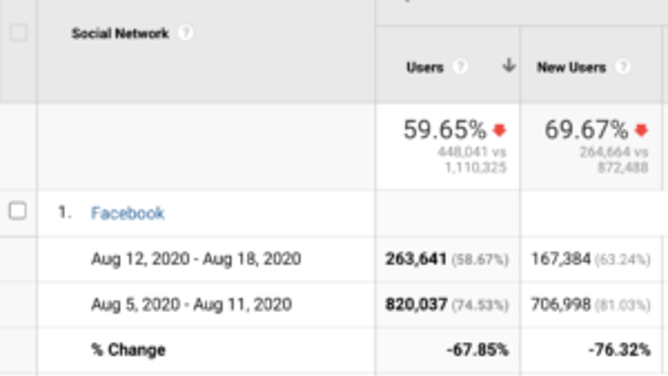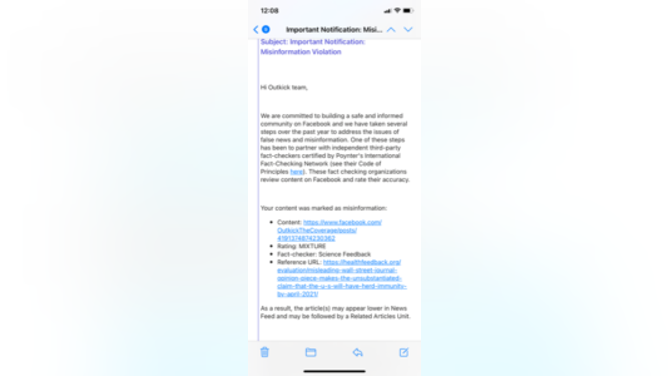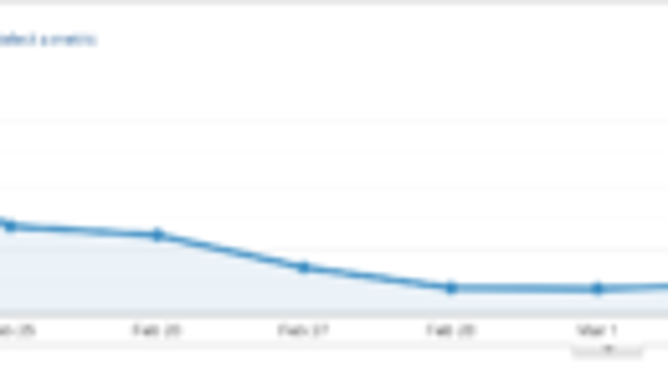ICYMI: Clay's House Judiciary Testimony On Big Tech and Cancel Culture
On August 11th, 2020 the president of the United States, Donald Trump, joined my morning radio show, OutKick the Coverage, to discuss, among other things, the importance of playing college football in the fall of 2020. The president was on my show for 25 minutes, and after the interview, we posted several articles related to it on OutKick, the website I founded and own, which is one of the largest independent sports and opinion websites in the country.
The articles were well received by our audience because the president advocated a position both I and my site had been supporting for months: the importance of sports being played, despite the challenges of COVID, college sports in particular. At the time, there was massive pressure for college sports to be canceled for the fall. Indeed, within a few days of the president appearing on my show, the Big Ten and Pac-12 would announce the cancellation of their fall sports seasons. (Those decisions would later be reversed after immense pressure from players, coaches, fans and the diligent work of the White House to help facilitate the return of sports in the Big Ten.) Our site traffic soared that Tuesday, setting new records as our news-breaking interview with the president of the United States reverberated across the media world.
But the next day -- and for the next week -- our site traffic crashed.
Why?

Because Facebook killed our traffic. Overnight, our readership vanished on their site. We lost 68% of our Facebook users and 76% of our new users on the site.
Given the fact that the sudden drop in Facebook traffic was costing us tens of thousands of dollars, hundreds of thousands of dollars over the next month, our tech team at OutKick analyzed all the data to see what had changed.
According to our tech team, nothing in our posting schedule or article topics had changed at all. The only plausible explanation for Facebook's sudden decision to restrict our traffic was the Trump interview. Because we'd featured favorable coverage of President Trump and his opinions on college football, Facebook punished us.
We haven't publicly discussed Facebook's decision to tank our site traffic in the wake of the Trump interview before because our business team said if we went public with their decision, they would likely punish us even more severely.
The result of the lost traffic on our site was substantial. Given we are paid based on the number of impressions our content receives, Facebook's alteration in our traffic after that Donald Trump interview cost us several hundred thousand dollars. In the weeks and months ahead, we tested articles with Joe Biden's name in the headline to see if there was any impact on our traffic at all.
There wasn't.
Only Trump triggered site traffic collapses on Facebook. And in the event some try to argue readers simply weren't interested in these Trump stories, this isn't true. Our site metrics proved that readers arriving from outside Facebook's walls consumed these articles even more than they did other articles on the site. This was Facebook deciding which stories their readers saw, plain and simple.
If we wrote too often and too favorably about the president, Facebook punished our site. If we didn't mention Trump very much, our site traffic grew. The power of Facebook was clear and their message was too: if you post content we don't like, your audience will vanish.
This was a chilling lesson.
And a scary one too.
We, a media company in 2020, had to a make a decision about whether to censor our writers' thoughts and observations for fear we would lose much of our ability to be heard and to monetize our content. This is an abuse of power by Facebook, a sign that their unrestrained and virtually unchecked power to control what Americans see on the internet is nearly all-encompassing.
While Facebook would likely blame their algorithms for this traffic collapse at OutKick, that's a red herring. Algorithms are designed by humans, and the results are monitored. Facebook can make any site soar in popularity or crush their traffic.
And they can do it in an instant.
But it's not just Facebook. This is the power of Big Tech writ large. We are living in a new gilded age, where tech billionaires -- maybe soon to be trillionaires -- have more power than any elected official in the land. Facebook's Mark Zuckerberg, Twitter's Jack Dorsey, Apple's Tim Cook, Alphabet's Sundar Pichai and Amazon's Jeff Bezos have more power today than Andrew Carnegie, J.P. Morgan, John D. Rockefeller, and Henry Ford ever did in the earliest days of the 20th century. These modern-day tech monopolists can pick presidential election winners, control our national debates, and decide whose voice is heard and whose voice is not heard. The Supreme Court no longer decides what the law of the First Amendment is in this country, these tech executives do. In practice, Big Tech controls the country.
And they control the country by deciding what you see.
And Big Tech's power is only growing in the wake of Joe Biden's election.
Just last week, Facebook flagged an OutKick article based on an excellent Wall Street Journal editorial by a Johns Hopkins professor, Dr. Makary. Our OutKick headline was straight forward and direct: "Johns Hopkins Medical Professional: Herd Immunity Will Be Here By April." It then laid out the argument of the doctor and linked to the Wall Street Journal piece for anyone who wanted to consider his arguments in their totality.
We shared our own article on Facebook.
Shortly thereafter we received the following email from Facebook.

The subject line was positively Orwellian.
Subject: Important Notification: Misinformation Violation
Our thought crime, according to the fact checkers at Facebook?
We had shared an OPINION PIECE that Facebook's fact checkers disagreed with. Again, this was an opinion piece by a highly-credentialed doctor giving his opinion on an uncertain future event. This was the second time an OutKick article had been labeled as misinformation. The other labeling occurred after we LINKED TO THE CDC'S OWN WEBSITE on COVID-19 data. The thought police at Facebook labeled both articles as violations of their site policies, and our Facebook traffic collapsed by over 80% in the ensuing weeks, costing us hundreds of thousands of dollars once more.
We appealed both fact check rulings by Facebook. The company never responded or changed their determinations, despite both decisions clearly being made in error. Not only was Facebook deciding what its audience could see, it was unwilling to provide any measure of due process when its fact checkers erred. There was no appeal, no opportunity to be heard. Facebook was an information dictator, judge, jury and executioner, all in one all-powerful seat.

Facebook's message in both circumstances was clear: if you share opinions we don't like, you will pay the consequences.
And in the case of media companies, let me be clear: the consequences are often direct and consequential when it comes to finances. Facebook controls the ability of many companies to make payroll and meet their business goals.
For many businesses, Facebook's market control, when combined with Instagram, is near complete.
Facebook is not a neutral platform and neither are most of the Big Tech publishers, which claim neutrality.
Consider the power of Twitter as well to serve not just as platform, but as an opinion-based publisher as well.
Several months ago, one of our writers posted an opinion piece about women in sports media, specifically addressing the different standards of speech for men and women sports commentators. The piece received ample attention on the internet at large, including on Twitter.
The day it was published, the article went viral on Twitter's trending topics section.
The Twitter explanation of why the story had gone viral stated as follows: “The writer opens himself up to criticism after making sexist comments about ESPN hosts.”
This is not a neutral comment from a tech platform. Someone at Twitter, we don't even know who, decided to label his column as sexist against ESPN hosts. That's certainly an opinion an individual reader could have, but why should Twitter, which claims to be an independent tech platform, be making editorial decisions about what content says? That's not what platforms do. That's what publishers do. This distinction is important because Twitter argues it isn't responsible for the comments made on its platform because it's not a publisher.
But what about when they clearly exercise opinion-based editorial judgments, which happens all the time? There is no actual distinction, in these cases, between publisher and platform. They are one and the same.
The message from Twitter was clear: if you have an opinion we disagree with, we will attack you, labeling you as sexist. And this is something that, as a media owner, I see happening every day to countless individuals across the country.
During the election, Big Tech companies colluded and conspired to keep the New York Post's story on Hunter Biden's Chinese and Ukrainian business interests from being read and shared on their site. Twitter even locked the account of the New York Post, one of our nation's oldest newspapers. How is this anything other than a direct editorial decision? Twitter decided it didn't like the Post's content and refused to allow it to be shared.
Tech companies colluded to ensure the story wasn't widely shared on their platforms.
Shortly after the election, Amazon Web Services shut down Parler, refusing to even allow the site to be hosted on the internet. It is nothing short of a modern-day book burning, an incredible irony given Amazon was founded to provide every book to readers. Apple followed suit, banning the Parler app from inclusion on its App store.
Effectively, these tech companies had colluded to destroy the business of a company they disagreed with. I don't believe we could find a more chilling example of anti-trust activity by monopolistic companies in our nation's media history.
But it wasn't just happening to Parler.
It was even happening, ostensibly, to the most powerful man in the world, the president of the United States, Donald Trump.
In January of this year, Facebook, Twitter, Google, Spotify, Snapchat, Instagram, Shopify, Reddit, Twitch, YouTube, TikTok, and Pinterest all either banned or restricted the democratically-elected president of the United States at the time, Donald Trump, from speaking to the country on their platforms.
The tech companies were making it very clear: they were more powerful than our nation's democracy.
Just in the past month, the United States Congress built on this Big Tech collusion by holding hearings demanding Fox News and other conservative networks not be carried in the cable bundle. Why are hearings like these possible? Because the Big Tech companies have set the precedent that if they don't like the speech, no one else should hear it either.
We are now witnessing a potentially much larger collusion forming between the Big Tech companies and at least one political party itself. But let's not fool ourselves into thinking Big Tech will always be on this one side. As the pendulum of society swings, so too will what they censor continue to grow. The digital book burning, in other words, is growing, not shrinking, in the wake of Donald Trump's defeat.
As a lawyer who owns a media company, I believe we have effectively ceded our nation's First Amendment rights to the titans of the tech industry. These monopolistic tech companies are so powerful -- and frequently are working in such close concert with one another -- that they can shut down any ideas that displease them and crush any companies that don't toe the line when it comes to supporting their practices. The result of non-compliance is a modern-day digital purgatory: either you stay silent in the hopes these tech companies don't notice your platform and substantially restrict your ability to run your business, or you speak out and the very foundation of your business itself is in danger.
Before I agreed to speak today, there was an internal debate inside OutKick. Should we or should we not speak the truth today, knowing that in so doing, there was a very real chance these tech monopolies might take aim at us and attempt to cancel our business?
As the owner of the company, it was ultimately my choice, and I decided to say what many media companies in the country are too afraid to say: it's time for Big Tech to be held accountable for their censorious and anti-First Amendment practices. It's way past time for more of us in media to speak out aggressively about the importance of America's marketplace of ideas, and we can no longer allow the modern-day versions of the robber barons in early 20th century America to continue to own our country's marketplace of ideas.
I am not a rabid partisan. I worked on Al Gore's 2000 presidential campaign, donated money to John Kerry's presidential campaign in 2004 and worked to help elect Barack Obama twice. But in 2020, I voted for Donald Trump, the first Republican I have ever supported for president. I did so not because I believed Donald Trump was a perfect candidate, he certainly wasn't, but because I care more about the robust and uninhibited exchange of ideas in our country than I do anything else. I am a First Amendment absolutist, and I believe cancel culture intertwined with identity politics is the greatest threat to our country in my life.
This is not a partisan issue.
We must have content-neutral policies in the online world, and we cannot allow Big Tech companies to pick and choose which sides they favor, artificially impacting the marketplace of ideas in the process. It's well past time that everyone, Democrats, Republicans, and independents recognizes the truth: Big Tech controls our digital lives, and they aren't being held accountable for that control.
Our system for online discourse is completely rigged and totally broken.
We must change that.
Now.
...